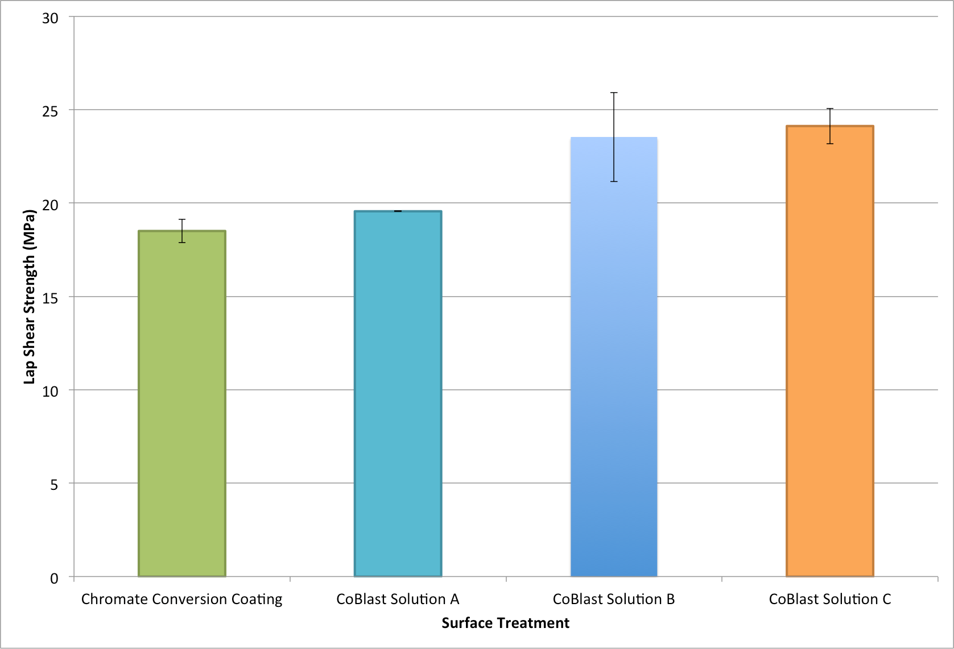In modern vehicle construction, the use of structural adhesives is often preferred to the traditional methods of riveting and welding. Not only do structural adhesives provide a sizeable cost saving per vehicle over the traditional methods, but they also dramatically reduce the weight of the vehicle. Adhesive-bonded vehicles are more rigid, allowing thinner sheets of metal to be used in their construction and also improving the handling performance of the vehicle. In addition, the use of structural adhesives means that dissimilar materials can be bonded together, which is vital for lightweight materials such as carbon-fiber.
At present, wet chemistry surface treatments are used throughout the automotive industry, aerospace industry and even the mobile devices industry in order to promote adhesion. These wet chemistry processes involve very hazardous chemicals such as acids and chromates, which are very harmful to the environment. The disposal of the hazardous waste from these chemical baths is an expensive process with very strict regulations on pollution prevention. The EU is implementing REACH regulations to restrict the use of these hazardous chemicals, which will have dramatic cost repercussions to the automotive and aerospace industries.
ENBIO’s CoBlast coating technology is a one-step, environmentally friendly, dry process, that does not rely on these hazardous chemicals. CoBlast aims to solve these challenges faced by the automotive, aerospace and mobile devices industries. Not only does CoBlast remove the need for hazardous chemicals, it also reduces the surface treatment process to a simple one stage process which in turn will reduce cycle time and the required factory floor space.
ENBIO’s CoBlast technology has already proven successful within the space sector, with ENBIO’s ‘SolarBlack’ coating acting as a thermal control coating on the European Space Agency’s Solar Orbiter mission. ENBIO has accomplished similar levels of success within the aerospace industry with the opening of ENBIO Aerospace in Northern Ireland in 2014. ENBIO now aim to replicate this success within the automotive industry, developing coatings for the most advanced bonding applications in the industry.
Using CoBlast technology, ENBIO are capable of depositing an adhesion promoting ‘Skin’ on substrates such as aluminium, titanium, stainless steel, mild steel and many more. When bonded using an automotive grade epoxy adhesive, the achieved lap shear strengths of ENBIO’s CoBlast ‘Skin’ are found to outperform the current industry standard coating (chromic acid anodised + primer). These results highlight both the environmental and adhesion benefits of the CoBlast process over conventional wet chemistry surface treatments. The CoBlast process not only outperforms industry standards in the bonding of similar materials, but can also be implemented to promote the adhesion of dissimilar materials and has had huge success with Titanium-CFRP (Carbon Fiber Reinforced Polymer) bonding which has many applications within the aerospace & automotive industries. This demonstrates the versatility of the CoBlast process and how the CoBlast ‘Skin’ can be finely tuned for each specific need within the automotive industry.
Alternatively, ENBIO’s CoBlast ‘Skins’ can be deposited to prevent adhesion. Using CoBlast technology, PTFE can now be deposited on various substrates to create non-stick coatings with customisable properties such as roughness. These PTFE coatings are currently being developed for mould release and low friction applications in the most advanced areas of the automotive industry.
The CoBlast process is now expanding from research based activities to large scale manufacturing activities. ENBIO are currently in the process of scaling up the CoBlast Technology into a large scale manufacturing activity, which will allow CoBlast to be implemented across the globe in many of the world’s largest production lines. CoBlast is the future of material surface treatments and this environmentally friendly, dry process will replace the harmful wet chemistry processes currently implemented within the automotive industry due to its adhesion benefits and significant environmental benefits.

Joe Flanagan




